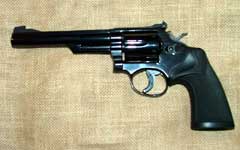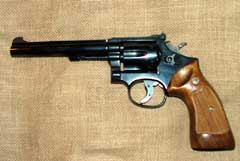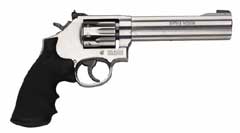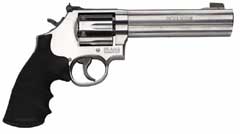|
As
readers of Gunblast know, I am a firm believer in the S&W
Model 19, 357 Magnum. Having owned and used them for
over 30 years, I have nothing but praise for the fine weapon.
They are easy to carry, powerful and very accurate. In fact, for
deer size game animals and smaller, the Model 19 is my preferred
firearm. Over the years, I have developed several very good
hand-loads for the 357 and proven them to be completely
effective with many one shot kills of White Tail deer. Iíll
share some of my favorite loads below.
|

S&W Model 19, .357 Magnum
(Click picture for larger version) |
I
am also a firm believer that you should do in practice like you
would in the game, so the majority of my use of the Model 19 has
been with full magnum loads. In my testing, I used a number of
different bullets and powder, but finally settled on the Sierra
Hollow Cavity design for both defense and hunting. At normal
handgun hunting ranges, something less than 60 yards, the bullet
performs excellently in both penetration and expansion. On deer,
I always go for a lung shot and have always been rewarded with a
clean one shot kill. Of all the deer taken with this round, I
have never had one run more than 30 to 40 yards and many simply
dropped on the spot. My favorite load as shown below is the 13.5
grains of 2400 behind a 150 grain JHP.
| Bullet |
Powder |
Primer |
Velocity (fps) |
Accuracy |
| Sierra 146-gr HC |
2400, 15.0 grains |
CCI 550 |
1300 |
2.0" |
| Sierra 150-gr HC |
2400, 13.5 grains |
CCI 550 |
1275 |
1.5" |
| Sierra 150-gr HC |
2400, 14.0 grains |
CCI 550 |
1300 |
2.0" |
Test
loads were fired from supported wrist at 30 yards on a mild
summer day.
I
did not include any data for lighter bullets since I have found
no need for them. Using the Sierra hollow cavity bullet provides
great expansion on everything from ground hogs to large
whitetail deer. Also, while I have fired a number of cast
bullets in my Model 19, I have found nothing that shoots as well
as the jacketed hollow point.
At
one point in the early 1980ís I was struck with the idea that
a appropriately matched 22 LR revolver to use for small game and
target practice would be great fun and excellent practice for
more serious work with the 357. To this end, about 1982, I
purchased a Smith and Wesson Model 17, 22 LR. The Model 17 is
the same frame configuration, barrel length, sights, and trigger
as the model 19. So use of the 22 would directly translate to
the 357.
|

S&W Model 17, .22 LR
(Click picture for larger version) |
A
welcome side benefit is much more banging for the buck. In no
time at all, I became very proficient with the 22 and used it
regularly for ground hog and squirrel hunting. I can recall one
incident where a ground hog had taken up residence on the far
side of my Fathers garden. He had constructed his den on
some high ground about 10 yards from the garden edge. I had been
keeping an eye out for the varmint for several hours one morning
and had observed him pop out of the den a couple of times. As
soon as I would make a move he would quickly dive for the den or
if sitting in the opening, just drop back down into the den.
Frustrated that I couldnít close the 60 yards for a good shot
with the 22. I contemplated going for the rifle. About that time
my Uncle drove up and inquired as to what I was doing. Just as I
explained the situation the old ground hog stuck his head and
shoulders out of the den. When I drew the revolver from my
holster, my uncle quickly offered his opinion that I could never
hit it with the 22. At that I decided to kneel and rest my
support arm on my left knee to steady for the longer than normal
shot. With my Uncle as witness to my success or failure, I
took careful aim with the Model 17 and fired a single shot. The
ground hog quickly dropped back into the hole followed by Uncles
prompt assessment that I had certainly missed. I walked over to
the den and lifted the dead ground hog out of the entrance hole.
It had met with one 22 LR HP in the neck.
The
moral of the story is that you get a lot of opportunities to use
a good 22 handgun. Hunting ground hogs, squirrels, or varmints
of all types, even plinking walnuts from a tree near the house
offers excellent practice using a handgun with almost identical
weight, sights, grip and trigger to the model 19, 357 Magnum.
You can shoot all day for a few dollars and not tire your grip
with the recoil of the 357. So with regard to the best practice
round for the model 19, 357 Magnum, I would say use your hunting
load or the 22 LR. Get yourself a similar pair and see if your
proficiency on the target range and in the field doesnít
dramatically improve. Also, youíll have a great deal of fun in
the process.
Today
S&W makes an excellent pair in the models 617 and 686.
|

S&W Model 617, .22 LR
(Click picture for larger version)
Caliber:
.22LR
Capacity: 10 Rounds
Barrel Length: 6"
Front Sight: Patridge
Front
Rear Sight: Adjustable
Grip: Rubber
Frame: Medium
Finish: Satin Stainless
Overall Length: 11
1/8"
Material: Stainless
Steel
Weight Empty: 45 oz. |
|

S&W Model 686PP, .357 Magnum
(Click picture for larger version)
Caliber:
.357MAG/.38+P
Capacity: 6 Rounds
Barrel Length: 6"
Front Sight: Patridge
Front
Rear Sight: Adjustable
Grip: Rubber
Frame: Medium
Finish: Satin Stainless
Overall Length: 11
3/8"
Material: Stainless Steel
Weight Empty: 44 oz. |
Butch
Kent
NOTE: All load data posted on this
web site are for educational purposes only. Neither the author nor
GunBlast.com assume any responsibility for the use or misuse of this data.
The data indicated were arrived at using specialized equipment under
conditions not necessarily comparable to those encountered by the
potential user of this data. Always use data from respected loading
manuals and begin working up loads at least 10% below the loads indicated
in the source manual.
  
Got something to say about this article? Want to agree (or
disagree) with it? Click the following link to go to the GUNBlast Feedback Page.
|
![]()